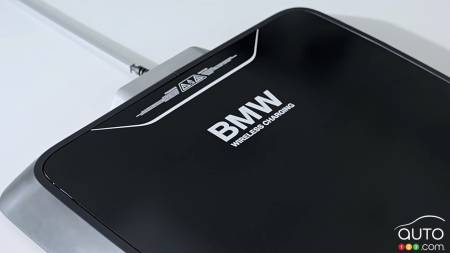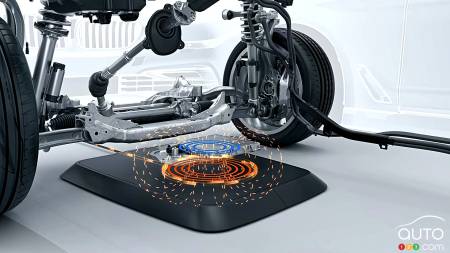If you’re one of the many consumers considering purchasing an electric vehicle next time around, take not that a revolutionary new charging technology is at our doorstep. Like smartphones, which can increasingly be recharged by induction, cars will soon be rechargeable without having to be plugged in.
A number of automakers are already hard at work on this technology. Now, BMW is set to be the first to make the system commercially available. Its great rival, Mercedes-Benz, is also developing the system and plans to introduce it soon in its S-Class model.
At BMW, the first model to benefit from its inductive charging technology will be the 2018 530e. Initially the manufacturer will offer the technology in its cars sold in the U.S., China, Germany, Japan and the United Kingdom.
The way the system functions is actually quite simple. A pad containing a coil is placed on the floor; the coil transfers electricity via a magnetic field to another coil located on the vehicle’s under-carriage. The system has a 3.2 kW capacity, or enough to recharge the 530e’s 9.2 kW battery in 3.5 hours. According to BMW, the system has an 85% efficiency rate.

The obvious advantage of this wireless system is, well, the absence of a wire. As well, since the pad is made to be waterproof, it can be used outside. This will make it much more practical for people who don’t have ready access to a power outlet in proximity to their car to own an electric car, for instance those who live in apartment buildings or where space is at a premium.
As for positioning the car in the correct position to recharge, there again BMW has made sure that simplicity is in order. The car’s multimedia screen tells the driver if the vehicle is properly placed to activate the system.
To come back to the smartphone comparison, the technologies surrounding electric cars are similarly expected to develop at a breathtaking rate in the coming years. Today’s cutting-edge advances might be seen as positively archaic within just a few short years.
This technology almost makes it easy to imagine that at some point in the future, cars will be recharged by the very roads they drive on.
Sound like science fiction? Maybe, but limits are boundaries we impose on ourselves, and when it comes to electric mobility technologies, those limits don’t seem to be there at the moment.
